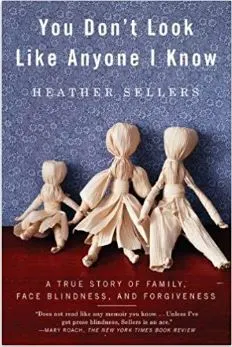A couple of weeks ago I was reading a magazine article and ran across a mention of You Don't Look Like Anyone I Know: A True Story of Family, Face Blindness, and Forgiveness by Heather Sellers. It sounded interesting, so I requested a copy via interlibrary loan (and as an aside: Can I just express my deep abiding love for interlibrary loan? Talk about the world at your fingertips!). But anyway, back to the book:
You Don't Look Like Anyone I Know is Sellers' poignant memoir of living with prosopagnosia, a rare neurological condition that prevents her from recognizing peoples' faces. Throughout the book, her story of face blindness is intertwined with the story of her lifelong journey to come to terms with a childhood spent bouncing between her paranoid schizophrenic mother and her alcoholic father.
I started reading You Don't Look Like Anyone I Know because the concept of face blindness is fascinating -- that is, the real, true inability to distinguish between faces, as opposed to just having trouble remembering names or picking people out of a crowd. Throughout her life, people think Sellers is snobby or dislikes them when she fails to recognize friends, coworkers, and even her own boyfriend (and later, husband and stepchildren) when she's unable to distinguish them by hair, gait, build, or other physical cues.
One memorable scene in the book even has Sellers seated in a restaurant across from a colleague who spends their lunch complaining about her committee chair and workplace politics. When her friend turns to look for their server, she is horrified to realize that the very men she was talking about were sitting at a table behind her the whole time. Sellers, of course, couldn't recognize their mutual colleagues even though they were directly in her line of sight, but her friend can't understand why she failed to warn her. This vignette epitomizes a lifetime of misconceptions and social struggles, and helps explain Sellers' difficulty in forming meaningful relationships with others.
As Sellers learns to put a name to her condition, though, she struggles with the why. Did growing up with a paranoid schizophrenic cause this? Is her prosopagnosia genetic? Could it have been caused by physical trauma in childhood? You Don't Look Like Anyone I Know therefore also delves into Sellers' dysfunctional childhood, and over half the book is devoted to exploring this underlying narrative. Although this wasn't what I expected going into the book, Sellers does a masterful job here building structure from the necessarily fragmented story of her life -- and both narratives are equally compelling.
The underlying themes of family, forgiveness, and self discovery make You Don't Look Like Anyone I Know a compelling memoir, if not an easy read. Some parts of Sellers' life (including a few mysterious mentions of a brother, although he figures in none of the stories recounted here) seem to be glossed over, but by and large the book provides an honest and unflinching examination of some very tough issues. Recommended.
What are you reading this week?
What have you been reading lately? Tell us about it! ? And, you can browse all the What’s Rachel Reading? book reviews here.


Sara
Friday 5th of May 2017
I highly recommend The Cubs Way by Tom Verducci to any baseball fan.